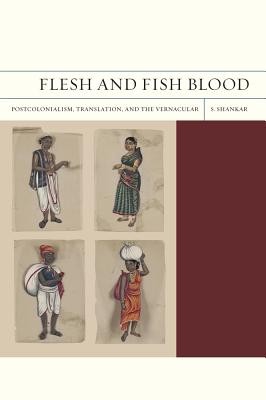
- We will send in 10–14 business days.
- Author: Subramanian Shankar
- Publisher: University of California Press
- ISBN-10: 0520272528
- ISBN-13: 9780520272521
- Format: 15 x 22.6 x 1.3 cm, minkšti viršeliai
- Language: English
- SAVE -10% with code: EXTRA
Reviews
Description
In Flesh and Fish Blood Subramanian Shankar breaks new ground in postcolonial studies by exploring the rich potential of vernacular literary expressions. Shankar pushes beyond the postcolonial Anglophone canon and works with Indian literature and film in English, Tamil, and Hindi to present one of the first extended explorations of representations of caste, including a critical consideration of Tamil Dalit (so-called untouchable) literature. Shankar shows how these vernacular materials are often unexpectedly politically progressive and feminist, and provides insight on these oft-overlooked--but nonetheless sophisticated--South Asian cultural spaces. With its calls for renewed attention to translation issues and comparative methods in uncovering disregarded aspects of postcolonial societies, and provocative remarks on humanism and cosmopolitanism, Flesh and Fish Blood opens up new horizons of theoretical possibility for postcolonial studies and cultural analysis.
EXTRA 10 % discount with code: EXTRA
The promotion ends in 22d.17:34:36
The discount code is valid when purchasing from 10 €. Discounts do not stack.
- Author: Subramanian Shankar
- Publisher: University of California Press
- ISBN-10: 0520272528
- ISBN-13: 9780520272521
- Format: 15 x 22.6 x 1.3 cm, minkšti viršeliai
- Language: English English
In Flesh and Fish Blood Subramanian Shankar breaks new ground in postcolonial studies by exploring the rich potential of vernacular literary expressions. Shankar pushes beyond the postcolonial Anglophone canon and works with Indian literature and film in English, Tamil, and Hindi to present one of the first extended explorations of representations of caste, including a critical consideration of Tamil Dalit (so-called untouchable) literature. Shankar shows how these vernacular materials are often unexpectedly politically progressive and feminist, and provides insight on these oft-overlooked--but nonetheless sophisticated--South Asian cultural spaces. With its calls for renewed attention to translation issues and comparative methods in uncovering disregarded aspects of postcolonial societies, and provocative remarks on humanism and cosmopolitanism, Flesh and Fish Blood opens up new horizons of theoretical possibility for postcolonial studies and cultural analysis.


Reviews